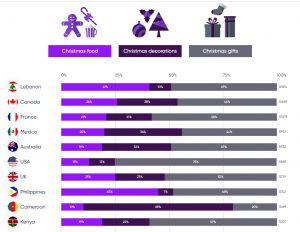The Crushing Cost of Christmas
The Crushing Cost of Christmas

WorldRemit graph comparing the average cost of Christmas in different countries
By Michelle Chermaine Ramos
The Philippine Reporter
Have you been carefully tracking your holiday spending? Or have you been using your credit card indiscriminately? Better take a tip from Santa by making a list and checking it twice lest you find something not-so-nice in your January bills. What you are not making a conscious effort of seeing can, and will, hurt your wallet.
If your family’s holiday spending habits are the same as the average Filipinos’, chances are you spend more than double of your monthly income on Christmas alone, which is all the more reason to plan and stick to a budget.
In contrast, Canadians spend 53% of their monthly income on Christmas expenses averaging at $2,111 CAD with 46% spent on gifts, 28% on decorations, closely followed by food at 26%.
In Mexico, a predominantly Catholic country like the Philippines, people spend 148% of their monthly income averaging around $1,197 primarily on gifts at 44%, decorations at 36% and less on food at 20%.
However, the shocker is the fact that this pales in comparison to how Filipinos spend 257% of their monthly income on holiday expenses averaging at around CAD$928. This is broken down to 48% spent on gifts, 45% on Christmas food and 7% on decorations. (https://www.worldremit.com/en/cost-of-christmas)
According to a study by WorldRemit based on the average number of children per household and the prices of typical Christmas meals, decorations and other expenses in 15 countries researched online between late October 2021 to early November 2021, gifts accounted for the highest cost in 10 of the countries listed. Canada ranked second on the list after Lebanon for Christmas spending, followed by France, Mexico, Australia, the USA, the UK and the Philippines in that order.
The Philippines is the fourth highest remittance recipient in the world and received US$34.9 billion in 2020. According to data supplied to CBC News by the Philippine Consulate General in Calgary in an article published on January 31, 2021, the Philippines received CAD$1.079 billion in remittances from Canada from January to October 2020.
The Senate of the Philippines’ April 2021 report on the Effect of COVID-19 Pandemic on OFW Deployment and Remittance found that Filipinos tend to send more money home during economic downturns or times of crisis. Although remittances dropped by 0.8% in 2020, it is still a significantly smaller decline which defies the 5% forecasted by the World Bank and 2% by the Bangko Sentral ng Pilipinas. (http://legacy.senate.gov.ph/publications/SEPO/AAG_Migration%20and%20Remittances%20%20amidst%20COVID%2019_final.pdf)
For 2021, remittances are expected to grow by 4% and already reached US $5.65 billion in the first two months of 2021 and have gone up by 1.6% from last year as of April 2021. Canada ranks seventh on the list of the top ten sources for cash remittances from 2019 to 2020. According to the World Bank, personal remittances to the Philippines accounted for 9.3% of the GDP in 2019 and rose to 9.7% in 2020, understandably due to the need to send funds to loved ones in the midst of COVID-19 lockdowns and job losses back home.

Corey Myckan,
WorldRemit Head of North American Growth in Canada.
With Christmas around the corner, remittances are set to increase this month. “Christmas is one of the most, if not the most important celebration of the season celebrated by Filipinos. Historically, the peak month that we see outflows of remittances and 10% of the annual remittances are sent every December,” said Corey Myckan, WorldRemit Head of North American Growth in Canada. “And we think the reasons for this partly are it’s often seen as a family obligation to send money back home, at least early on. And a majority of Filipinos arriving in Canada are taught that when you succeed, it’s important to give back to the people in the community that helps you.”
Although the Philippines ranks eighth on the list of countries for extravagant holiday spending, the fact that Filipinos spend 2.57 times of their monthly income for the holidays brings up the importance of financial literacy. Most Overseas Filipino Workers (OFWs) self-sacrifice by sending most of their earnings to family back home leaving very little for themselves which is risky should they fall ill or have any emergencies here with little to no support, savings or insurance. It is crucial to have a budget and for the senders and recipients to make a serious commitment to make conscious decisions on how they will be saving and spending their hard-earned cash. It is also imperative to not succumb to peer-pressure driven spending to avoid sinking into debt and being worse off in the following year with the rising prices of food and other expenses.
Myckan said his family also has a monthly budget to track expenses to avoid credit card bill shock. “In the past few months, we’ve not only in Canada, but the rest of the world faced that huge cost of living increase with inflation. And so, everything’s a little bit more expensive than it was before,” he explained. “We want people to spend within their means. We don’t want people to send money over what they can afford so that’s important. It’s important for them to be mindful of the challenges that exist in the Philippines and in Canada. Moving into this year, it’s really hard to predict what will happen with Omicron. It’s important to have a monthly budget of what you can afford.”



Comments (0)